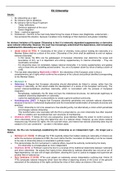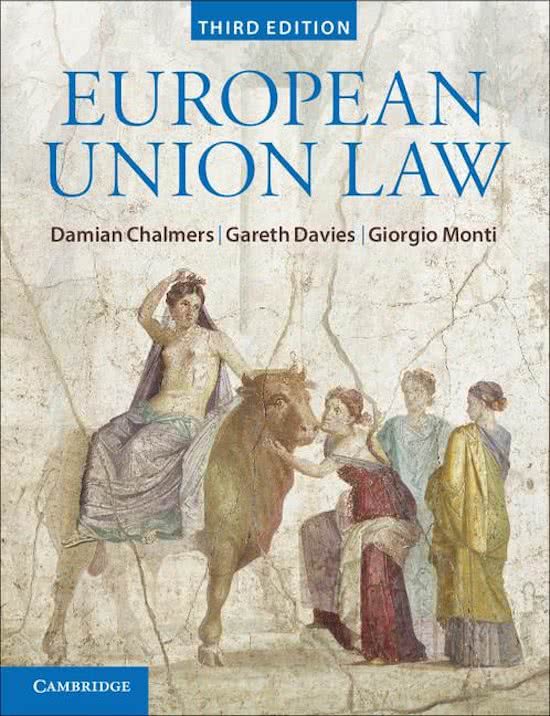EU Citizenship
Issues:
1. EU citizenship as a right.
2. EU Citizens right to residence
3. EU Citizens right to Equal Treatment
- Treaty restrictions
- Generous approach of the court
- Social integration
4. Dano – restrictive approach
5. Institutional – the ECJ is the main body determining the scope of these rules (illegitimate, undemocratic –
has worsened the situation, because it enables more challenge of their decisions and greater instability).
An intrinsic limitation of European Citizenship is that it is inherently dependent/supplementary or derivative
upon national citizenship. However, the court has increasingly undermined this dependence, and increasingly
established EU citizenship as a right in itself.
• Under Article 20 TFEU → ‘Citizenship of the Union is’ whereby ‘every person holding the nationality of a
Member States shall be a citizen of the union. Citizenship of the Union shall be additional to and not replace
national citizenship’.
- In this sense, the MS’s are the gatekeepers of European citizenship (can determine the scope and
boundaries of EC), as it is dependent and entirely supplementary to national citizenship – They are
inextricably connected.
- EU citizenship does not completely replace national citizenship, it is merely supplementary and applies
only to those who are travelling across borders. You are a European citizen by virtue of being a citizen of
a MS.
• This has been described by Martiniello (1998)→ ‘the citizenship of the European union is thus a
complementary set of rights which confirms the existence of the cultural and political identified corresponding
to the Member States’,
• Micheletti →
• Habermas → Argues that European citizenship should alternatively be linked to values, rather than the
concept of nationality, as this would enable the development of a sense of the European community. The
current interconnectedness prioritises nationality, which is inconsistent with the process of European
integration.
- Nonetheless, realistically, the EU does not have the institutional structures, nor democratic legitimacy to
establish citizenship dependent on nationality.
- Lacks the sophistication or preconditions to create a genuine political community.
• Kostakopoulou (2007) → Argues that ‘European citizenship penetrates and subverts national citizenship’
because it has led to ‘institutional displacement and the incremental transformation of domestic structures and
practices.’
- Union citizenship is not to be viewed as a free-standing entity, but alternatively a notion which penetrates
and changes national citizenship.
- This transformative view resonates with the ECJ’s jurisprudence, as union citizenship has often required
MS’s to redefine and reconstitute their own structures of membership.
• Chalmers (2015) → Article 20 from one perspective ‘gives Member States the power to control access to
Union citizenship, since it is they who determine who is a national citizen. However, as ever where national
measures may influence EU rights, this link cuts both ways, and means that national citizenship laws may be
subject to EU Law constraints’ – as seen in the below cases.
However, the ECJ are increasingly establishing EU citizenship as an independent right – No longer just a
status.
• Rottmann (C-135/08) → Although the TFEU explicitly states that matters relating to nationality of citizens are
within the exclusive competence of MS, the court claims that the ‘revocation of nationality (in so far as it leads
to the loss of citizenship status) is amenable to judicial review’.
• This demonstrates the EU involvement in national affairs, beyond the authority conferred by the treaty.
- EU citizenship is conceptualised as more independent.
• Chalmers (2015) → ‘Rottmann opens the door to a reversal of the traditional relationship between nationality
and Union citizenship’. He argues that ‘typing Union citizenship to national citizenship was not just an act of
legal dependency, but also one of legal colonialism, allowing the Court of Justice to engage and supervise yet
another field of national law.’
• Ruiz Zambrano (C-34/09) →The court adopts an extremely narrow interpretation outlining that ‘Article 20
TFEU precludes national measures which have the effect of depriving citizens of the Union of the genuine
enjoyment of the substance of the rights conferred by virtue of their status as citizens of the union’.
, • Thus, irrespective of whether an individual even crosses a European border, an individual cannot legally or
factually be placed in a situation where their EU citizenship rights are undermined.
• This rearticulates the notion of European citizenship – as a source of fundamental rights granted merely as a
result of being a citizen within the EU, rather than crossing borders.
- What it means to be European is conceptually being transformed – the right is free-standing or merely
necessary to permit interstate migration.
• The ECJ’s case law is concerning for member states as this interpretation violates their autonomy to determine
the fundamental rights and norms and has institutional implications.
• The constitutionalisation of free movement – it has been transitioned into a basic right for all Union
Citizens, not only economically active ones.
• The ECJ has reiterated that ‘citizenship of the Union is destined to be the fundamental status of nationals of
the Member States, enabling those who find themselves in the same situation to receive the same treatment
in law, irrespective of their nationality’ – Grzelcyk C-184/99
• Implications that, Chalmers (2015) → ‘Non-discrimination rule may affect all areas of national law. Even if
these are primarily national and not EU competences, if they discriminate against migrants the rule will bite’.
• Moreover, the right to citizenship has further been extended to anything which restricts the ability of citizens to
move across borders – as demonstrated in Coman C-673/16 → Article 21 TFEU- now catches discriminatory
rules and even indistinctly applicable rules.
- The Court held that the refusal of a Member State to recognise, for the purpose of the grant of family
reunification rights, the same-sex marriage of a third country national and a Union citizen, which has been
concluded in another Member State during the Union citizen’s period of genuine residence in that State,
can impede the exercise of the right to free movement of the Union citizen.
• Therefore, in principle the court has created an extremely powerful right, similar to Article 34 and Article 56
TFEU – because an EU citizen has an unconditional right to move across borders.
• This consequently, has caused considerable tension when it comes to the welfare state.
This progressive case law led to the strengthening of rights for economically inactive citizens at the expense
of the Member states control over welfare policies
RESIDENCE: The right to entry/Residence for an economically-inactive individual does not automatically exist,
in contradistinction to EU workers who automatically obtain a right to residence:
• Before the Maastricht Treaty 1992, the economically active were the only individuals who had rights under
EU Law – this is symbolic in of itself – in that European citizens who do not work have not traditionally been
conceptualised as right-holders.
- There was no mention of European citizenship in the initial EEC, established via the Treaty of Rome 1957.
• Now, every national of an EU MS has EU citizenship, and distinctly applies to those individuals who move
across borders (Mobile citizens).Nonetheless, rights conferred on mobile European citizens are not
meaningfully transformative or automatic, by virtue of being a EU citizen, as it is by virtue of being a worker.
• Such rights include the right to move and reside in the EU under Article 21 TFEU, the right to vote Article 22
TFEU, as well as the right to petition the EP and Citizens initiative under Article 24 TFEU.
- These rights are very limited, as compared to the rights of workers in the EU.
• Article 21 TFEU → outlines that ‘every citizen of the Union shall have the right to move and reside freely within
the territory of the member States, subject to the limitation and conditions laid down in the Treaties’
• Chalmers (2015) → This is ‘the most useful right for Union citizens, and the one demanding most adaption
from national authorities’
• Florris-De-Witte → “Free movement is the central thing that EU citizenship should be about: it is what makes
EU citizenship distinctive from, and genuinely supplementary to, national citizenship.”
- Nonetheless, despite the importance of the right to residence and movement for EU citizens, there are
extensive restrictions for non-workers.
• In comparison to Article 45 for workers, Article 21 neither explicitly outlines what is not allowed, such as non-
discrimination (direct or indirect) in order to protect the individual, and further explicitly states there can be
limits to such a right as outlined ‘in the treaty’.
- Therefore, the rights conferred on both EU workers and EU citizens are extremely different.
• Member states can limit free movement and residence rights on the grounds of public policy, security and
health – defined under Directive 2004/08.
• These limits are demonstrated in Article 7 of the Citizenship Directive 2004/38 → which requires the migrant
to have ‘comprehensive sickness insurance cover in the host state’ and ‘sufficient resources for
themselves and family members not to become a burden on the social assistance system of the host Member





